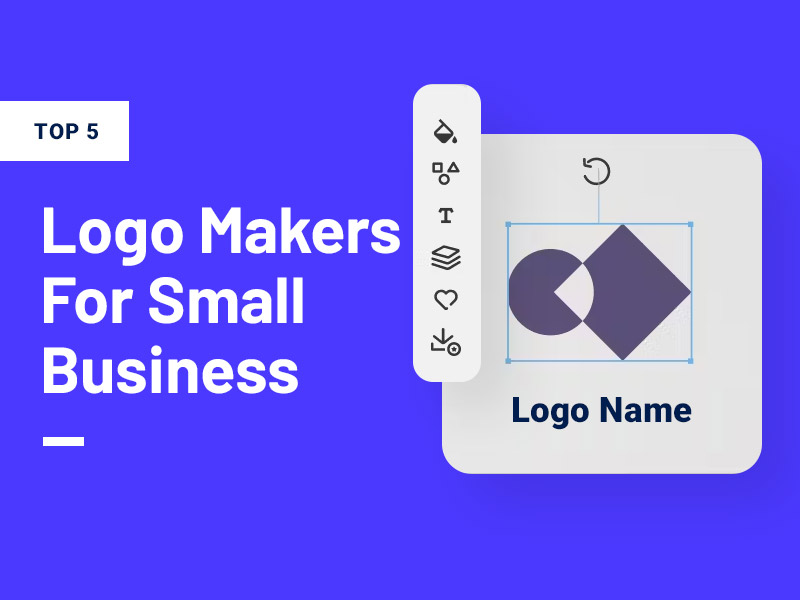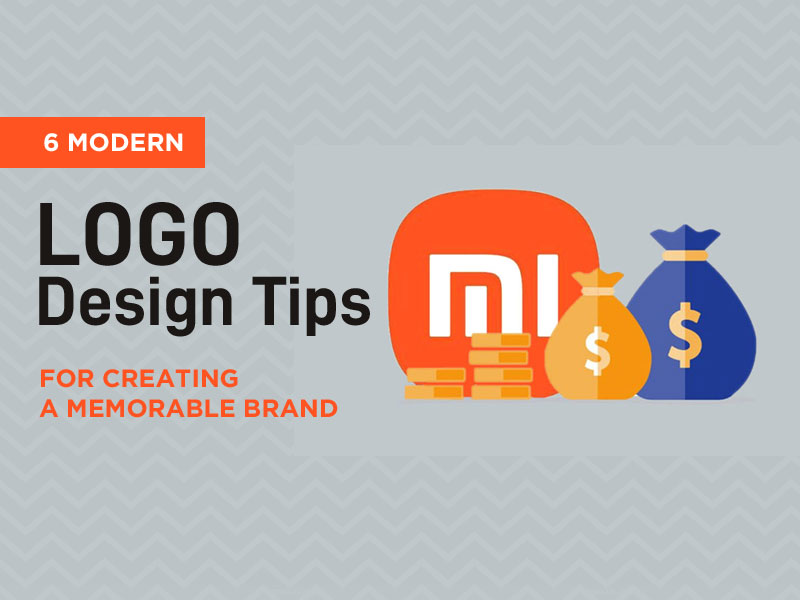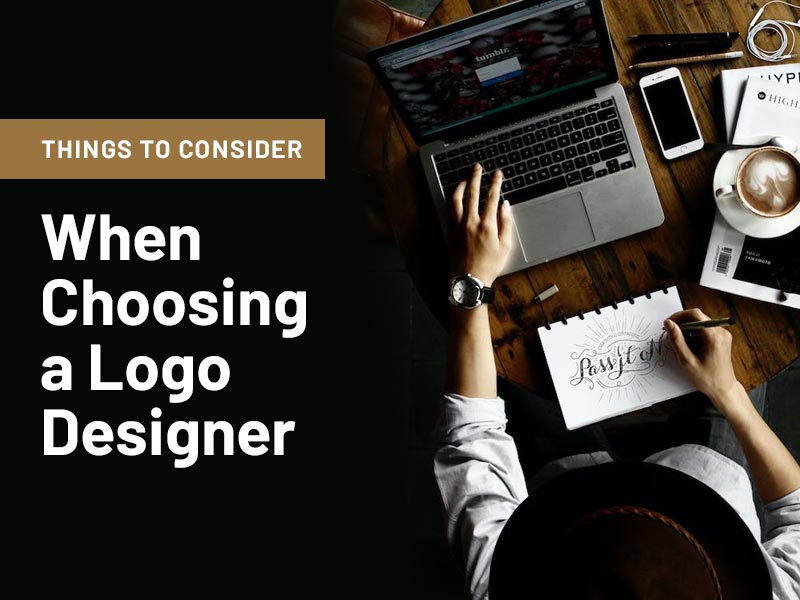Why are customers obsessed with certain products but uninterested in a similar one? Why do customers buy from one brand and ditch the others? These age-old questions have been asked countless times in the business world.
A survey conducted by Facebook on 15,000 persons revealed that brand loyalty and trust are affected mostly by cost, quality, experience, and consistency.
Some customers may prefer purchasing expensive items while others will avoid them like the plague.
Some customers may patronize a business because of their previous experience with that brand, while others seek out new experiences from diverse businesses.
The meteoric rise of fast fashion is clear evidence that most customers don’t prioritize quality either.
What every customer prioritizes above all else is consistency. And the first step to establishing a consistent business is branding and brand positioning – which you can read more about here.
Just like naming a business, the market doesn’t tolerate blunders, inconsistency, or even your overconfidence in prior successes when it comes to accurately positioning your company since times change and people adapt.
This is why we’ll be digging deep today to find the best methods for businesses to adapt to what’s occurring in the global economy.
And in order to do so, we’d look at:
- What is branding and brand positioning
- Apple’s effective brand positioning
- What is the significance of this positioning survey?
- Here’s why this question was needed?
- What the survey found out about positioning
- Breakdown of the study
- How does it work in practice?
- How does this affect you?
What is Branding and Brand Positioning?
There’s a reason why we hear the term ‘brand’ thrown about so often these days. From how brands have invaded Twitter, Instagram, and TikTok, it’s a little too clear that business owners are aggressively establishing powerful brands because they recognize that branding is everything in business.
What is Branding?
Jeff Bezos provided a compelling definition of branding that perfectly captures the concept. In his words, “Your brand is what people say about you when you’re not in the room.” Brands that stimulate good emotions in their consumers outperform those that stimulate negative thoughts in their customers.
Apple is a great example of a business that has established a trustworthy brand. A few decades ago, Apple was just the name of a fruit, but a quick Google search today reveals that Apple, the tech business, has surpassed Apple, the fruit, in a million different ways. Steve Jobs successfully reinvented the word, ‘Apple’ and gave it new meaning.
And just like Steve Jobs, Elon Musk called his firm Tesla in honor of Nikola Tesla, who happened to be one of the most brilliant electrical engineers of all time. However, by selecting the name Tesla, Elon pitched his automobile company as an innovative brand leading the path for human progress.
And the same way Steve and Elon positioned their company, consistently positioning your product to match a certain idea that connects with your clients is an excellent strategy for developing a strong brand identity for your company. That way, customers will be able to link your business with a certain ideal.
What Exactly is Brand Positioning?
Although your brand is a more defined image of your company, your brand’s position is a flexible strategy that your company uses to effectively represent itself in real-time and with current challenges.
Remember, although everyone was taken off guard during the epidemic, certain firms were able to solidify their image by correctly positioning their company.
One way they positioned their firm was by identifying with their customers’ needs through community engagement, financial donations, and offering much-needed services to people in need.
And companies that fail to position their company with their consumers constantly lose clients to better-positioned brands.
So, to wrap things up in simple terms, branding is all about building a system that makes your products and services easily recognizable to its customers. While brand positioning is the emotional value customers attach to your brand that sets your business apart from competitors.
Consider these stats:
- According to Fundera, 89% of shoppers trust and stay loyal to brands that share the same values with them, and 61% of customers are more likely to buy from businesses that offer unique content.
- Demand Metric revealed that consistent brands are 3.5 times more likely to enjoy excellent brand visibility than inconsistent brands.
- Consumer Thermometer notes that 64% of women and 68% of men have felt an emotional connection with their favorite brand.
- Gensler’s survey shows that 94% of customers are highly likely to recommend brands they love to their friends.
Apple’s Effective Brand Positioning
Apple, the world’s most valuable brand, developed a clear strategy that helped the brand position itself as a leader in its industry. Apple’s solid position in the market has been the cornerstone of its success, and it did it by shaping their:
- Core beliefs: Innovation, design, and imagination
- Brand strategy: Creating a worthwhile experience that connects to their customers and brings them into their brand’s ecosystem
- Position: Building their reputation as a luxury brand
- Emotion: Cultivating customer loyalty and trust
- Segmentation: Relating to their customers based on age, gender, income, location, etc.
Now that you know what brand positioning is and how it can make all the difference in the success of your business, it’s important you understand that properly positioning your business isn’t going to be easy.
So to assist you, we put several brand positioning concepts to the test to observe how people react to organizations that take a new vs. classic brand position.
What is the Significance of This Positioning Survey?
The goal of this study was to figure out which brands people are attracted to and how that differed depending on their demographics.
The data we gathered will help business owners, whether you run a small, medium, or large company, make a quick, well-informed decision that will position their company effectively.
However, in order to meet the survey’s goals, we asked Americans whether they would prefer to work with an established and reputable company or a new and modern one.
Want to Know Why We Needed to Ask This Question?
When launching or rebranding your company, it’s crucial to recognize that choosing your business’s tone is one of the most important and definitive branding decisions you’ll make.
The right tone is important because it empowers entrepreneurs, brand managers, and corporate executives to control their company’s personality and how customers perceive them.
Try to imagine how the market would have been today if:
- Jobs and Wozniak had named their company Executex instead of Apple
- Bezos had insisted on using Cadabra instead of Amazon
- Phil Knight had stuck with Blue Ribbon Sports instead of Nike
- Larry and Sergey had stuck with Backrub instead of Google.
Without a doubt, your company’s overall personality and consumers’ perceptions of your brand are influenced by the tone of your brand. You can’t afford to overlook your company’s tone when designing your name strategy because it’s so important to your brand positioning and branding.
Although there are several brand tones, most of them fall somewhere between ‘new and modern‘ and ‘traditional and trusted.‘
Take a look at some of the most well-known traditional companies:
- Warby Parker
- Liberty Mutual
- Blackstone
- IBM
Here are a few well-known, modern brands:
- Urban Decay
- Robinhood
- Accenture
- Apple
Our poll was specially created to determine which demographics of the audience are drawn to new businesses and which are drawn to classic enterprises. We did this because one of the most important decisions a firm must make when building its brand identity is to choose either to position itself as a modern or classic brand.
What the Survey Found Out About Positioning
The replies we received were surprising and refreshing, despite the fact that the survey’s conclusions were not earth-shattering. Here’s a quick rundown of what we learned from the 301 persons that participated:
People in their 25 to 34 are drawn to new firms—over 50% of those polled preferred current and trendy brands over well-known and reliable ones.
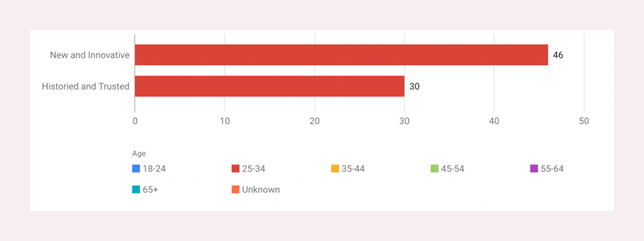
People aged 35 to 45 choose trendy brands over traditional and trustworthy ones. This group, on the other hand, was evenly distributed between the two possibilities.
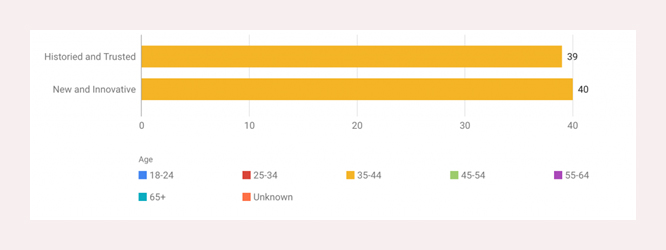
People between the ages 45–54 and 55–65 were more interested in classic and trustworthy brands.
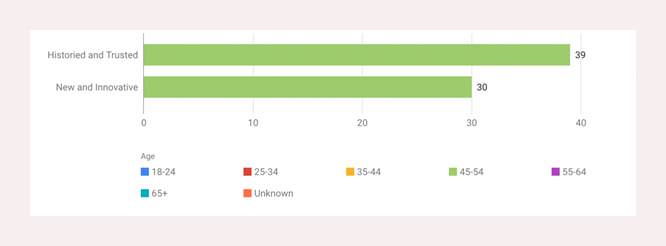
People aged 55 to 65 were particularly drawn to well-known and reputable businesses.
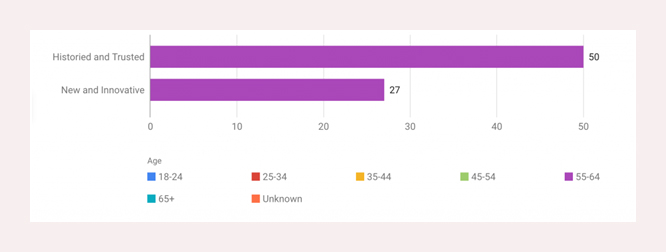
Men have very little bias for either new or historical brands, according to the survey’s findings.
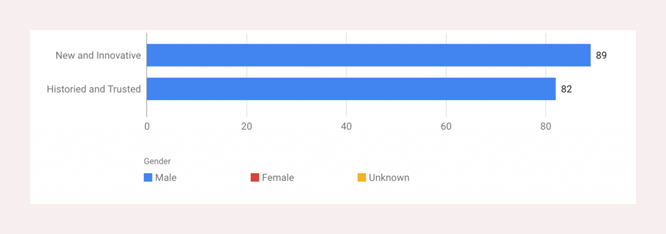
Women, meanwhile, prefer traditional and well-known brands over new and emerging ones.
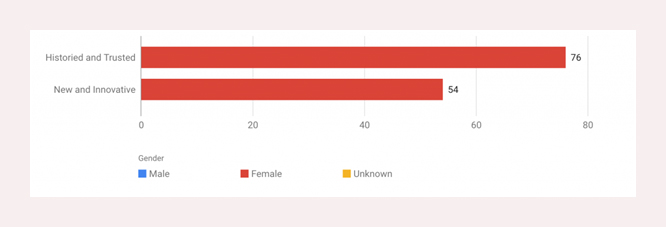
153 people out of 301 preferred traditional and trustworthy firms, while 148 chose trendy and creative ones. Based on the results of the study, it’s clear that businesses may take any stance they want as long as it’s in line with their core demographic.

Here’s a Breakdown of the Study
Younger participants in our survey aged 25 to 34 revealed that new and imaginative brands attracted them the most. So, when starting a business, make sure your branding, positioning tactics, and brand names are appropriate for your target audience whether they’re Gen Z, Millennial, or younger Gen X clients.
Now, customers between 45-65 years old show a strong preference for well-known companies. So, if you’re launching a firm, be sure to keep a traditional tone in order to appeal to Baby Boomers, older Gen Xers, and others in this advanced category.
Our study also offered insight into other situations where no definitive response was provided.
Generally, we noticed that women were more likely to patronize known and trusted businesses. There has long been several debates about whether women are more risk-averse than men.
And certainly, this is an intriguing approach that is entwined with a lot of profound biology and behavioral studies. And sure enough, it obviously needs more investigation.
But in any case, the only risky part of ‘modern and innovative’ startups is either in their name or principle. After all, that is the goal of your brand’s tone.
You can effectively plant your business in the minds of your customers if you begin working on building a compelling brand identity as soon as you have a brand name and a sound branding strategy.
What has our study shown about branding strategy? In terms of customer demography, tone is extremely crucial. Ensure you think about who you’re selling to before deciding on your brand, positioning strategy, or the brand direction for your firm.
How Does Brand Positioning Work in Practice?
Back in 2020, Netflix was booming. The virus had kept everybody indoors, and it’s safe to conclude that the entire country was in dire need of decent entertainment to keep us occupied and take our worries off the pandemic. And Netflix was the ideal product for it.
However, two years later, the firm is still struggling to find its place in the post-pandemic world. Customers are fleeing in droves because Netflix has disregarded its brand position by producing subpar series, raising pricing, and seeking to discontinue password sharing. Not to mention that competitors in the streaming business have soared.
How Does This Affect You?
By the end of our survey, we found that the majority of the younger generation are interested in fresh, modern, unique, and innovative companies. So ensure your firm has a unique, modern, and creative brand identity if you ever want to interest your younger audience.
But what if your target demographic is the older Gen Xers and Baby Boomers? Customers aged 45 and 65 are more inclined to classic organizations, so make sure your company’s positioning radiates a classic, conventional, and trustworthy brand.
According to the survey, if a founder wants to position their firm effectively, they need to concentrate on their products and the tone it communicates.
Getting a good brand name is one of the most successful methods to integrate your audience, product, and business, and using a strong business name generator is one of the quickest ways to get some great business name ideas.
Grant Polachek is the head of branding for Squadhelp.com, 3X Inc 5000 startup and disruptive naming agency. Squadhelp has reviewed more than 1 million names and curated a collection of the best available names on the web today. We are also the world’s leading crowdsource naming platform, supporting clients such as Nestle, Dell, Nuskin, and AutoNation.



